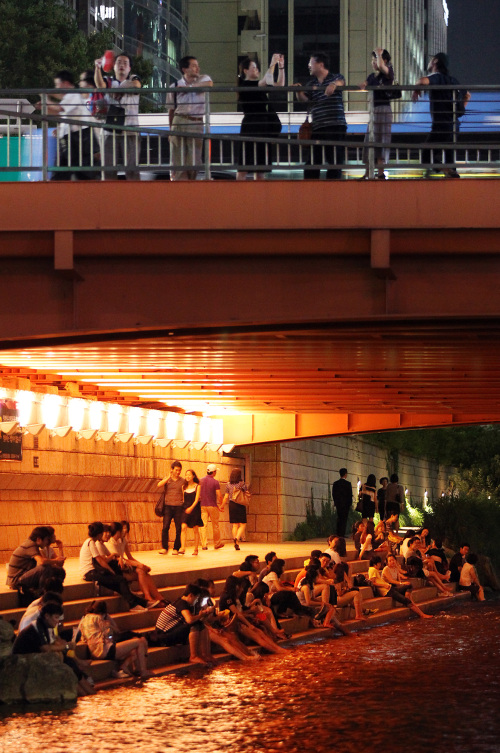The sweltering heat after the three-week-long rain spell is bringing sleepless nights to most parts of the nation as the daytime temperature stays well above 33 degrees Celsius and the nighttime temperature remains at above 25 degrees Celsius on average.
According to the Health Insurance Review and Assessment service, the number of people visiting medical facilities over heatstroke or sunstroke in July and August account for 78.2 percent of the number of people visiting hospitals for these conditions each year. Those 40 or older account 75.1 percent of these cases.
 |
Seoulites cool off at Cheonggye Stream in central Seoul on Monday as temperatures topped 32 degrees Celsius. (Yonhap News) |
The HIRA said heatstroke occurs when people work in small spaces without proper ventilation or perform physical exercise during the hot weather. Sunstroke takes place when the scorching sun’s rays cause the body’s temperature control mechanism to malfunction.
Such disorders cause nausea, lethargy and more. These symptoms may be accompanied by a severe headache.
The Ministry of Health and Welfare on Tuesday released a set of health guidelines for the extensive heat wave.
1. Avoid eating too much, drink lots of water: Eating hot food is not a good idea. Instead, drink water regularly. If you exercise, drink 2-4 glasses of water an hour. If you need to regulate water for other health problems, consult your doctor in advance.
2. When you perspire too much, drink sports drinks to add salt and minerals.
3. Wear loose clothes: Do not wear tight garments. Wear light rather than dark colored clothing.
4. Refrain from staying outdoors for a prolonged period of time and block sun’s rays: Morning and after sunset hours are best for outdoor activities. Noon to 5 p.m. is especially bad for going out.
When staying outdoors, try to rest in the shade regularly. Wear a broad-brimmed hat and sunglasses. Don’t forget to apply sunscreen on exposed skin. When indoors, use curtains and other tools to ensure the sun does not affect the skin.
5. When staying in a building, do not use air conditioner excessively: The government recommends an indoor temperature of 26-28 degrees Celsius. Also, using ovens or stoves too much could heat the indoor atmosphere too much. Do not use electric fans when the doors and windows are all shut.
6. Always look after your physical condition and do not exercise excessively: Give your body enough time to adjust to the heat. If you feel unwell, spare time to take some rest. Take showers often.
7. Look after people around you: If there are elderly people, infants, obese people, outdoor workers and those suffering from chronic illnesses such as hypertension, heart disease or even depression, check up on their health condition daily.
8. Do not leave children or animal in a parked vehicle alone: The inner temperature of a car goes up dramatically even if you leave windows open. It could be fatal.
9. Call 119 or 1339 in case of emergency: The patient should be moved to the shade. Remove clothes and sprinkle water onto their skin. Their body temperature should be cooled. Give them some cool water or a sports drink if they are conscious while waiting for paramedics to come.
By Bae Ji-sook (
baejisook@heraldcorp.com)








![[Today’s K-pop] Blackpink’s Jennie, Lisa invited to Coachella as solo acts](http://res.heraldm.com/phpwas/restmb_idxmake.php?idx=644&simg=/content/image/2024/11/21/20241121050099_0.jpg)